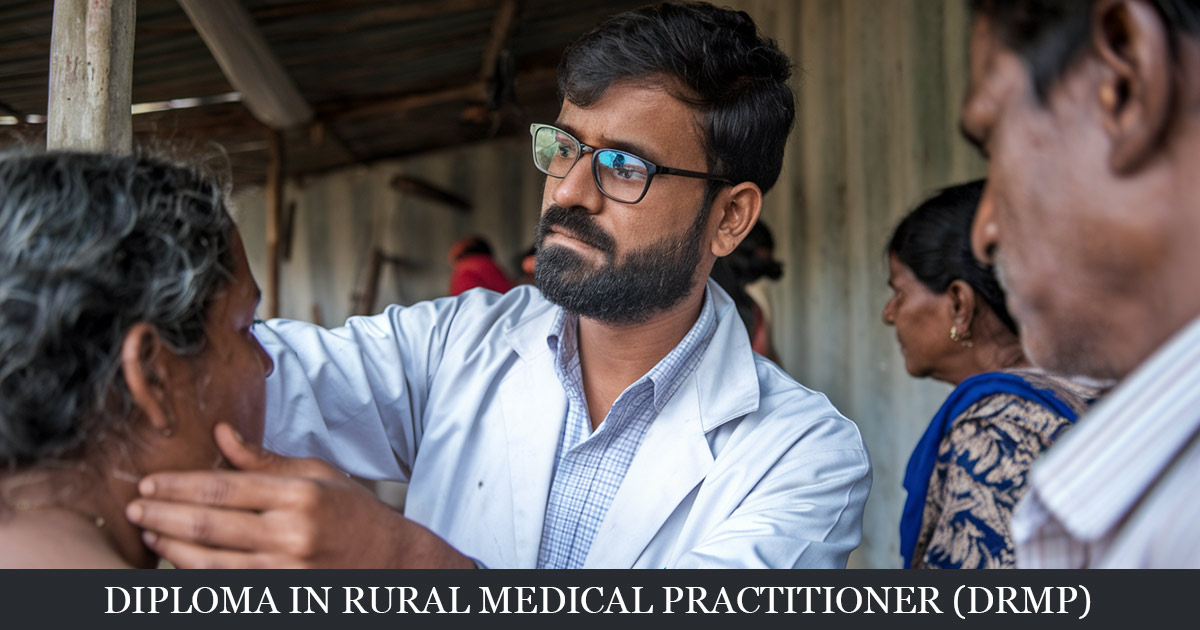
Diploma in Rural Medical Practitioner (DRMP-Allopathy)
By NCTA Team Last Updated: January 27, 2026Course Description
The Diploma in Rural Medical Practitioner (DRMP-Allopathy) is a two-year program designed to train individuals to address the healthcare needs of rural communities. Students acquire essential medical knowledge, including General Anatomy, Physiology, Pathology, and Nursing Care Skills. The course emphasizes practical training, enabling students to manage common illnesses, provide emergency care, and engage in community health promotion. They also develop skills in telemedicine for remote consultations and healthcare management. Field visits and workshops offer hands-on experience. Graduates are prepared to work as Rural Medical Practitioners, delivering primary healthcare, educating communities, and improving health outcomes in underserved areas.
Our organization is taking significant steps to support experienced doctors and practitioners through the DRMP-Allopathy registration process. By issuing certificates on a merit basis, we ensure that dedicated professionals are recognized and safeguarded under the rules of the Council and the government.
The DRMP Certificate, issued by the Vocational Council of Training Academy, provides proof of the duration of practice and aligns with the High Court of Chennai's judgment, the Planning Commission Report, and government letters (No. 110/8/4/77MPT/ME(P)1979 & No. 4-6/70 MPT of Govt. of India). This initiative contributes to strengthening healthcare services in rural areas and ensuring that skilled practitioners are available to meet the needs of these communities.
Course Duration & Fee
The program typically lasts for 2 years with a course fee of ₹24,350.
Eligibility Criteria
Completion of Class 10th or equivalent with a minimum of 45% marks. 2-3 years of experience in the medical field.
Course Structure
The curriculum covers a wide range of topics essential for rural healthcare:
1st Year
- Introduction to Rural Healthcare
- General Anatomy
- General Physiology
- General Pathology
- Health and Hygiene
- Primary health care
- Nursing Care Skills
- Practice Of Medicine
2nd Year
- Emergency Medical Care
- Maternal and child health
- Infectious Diseases and Prevention
- Nutrition and Dietetics
- Pharmacology
- Telemedicine
- Healthcare Management
- Practical (Project Based)
Learning Methodologies
- Lectures and Seminars: Theoretical knowledge provided through e-book study material.
- Practical Training: Hands-on training in healthcare facilities, including primary health centers and community clinics.
- Field Visits: Exposure to rural health settings to understand real-world applications.
- Workshops: Skill-based workshops on emergency care, first aid, and basic surgical procedures.
- Community Projects: Engaging with local communities to promote health education and preventive care.
Assessment and Evaluation
- Continuous Assessment: Through quizzes, assignments, and practical evaluations.
- Final Examination: At the end of each year, including both theoretical and practical exams.
- Project Work: Submission of a project report based on field visits and community engagement activities.
Career Opportunities
Graduates can pursue various roles, such as:
- Rural Medical Practitioner: Providing primary healthcare in rural settings.
- Community Health Worker: Engaging in health promotion and education.
- Healthcare Administrator: Managing rural healthcare facilities.
- Telemedicine Coordinator: Facilitating remote healthcare consultations.
Course Objectives
- Equip students with fundamental medical knowledge, including anatomy, physiology, and pathology.
- Prepare students to deliver primary healthcare services, manage common illnesses, and provide first aid.
- Develop skills for promoting health education, hygiene, sanitation, and preventive healthcare within rural communities.
- Train students to handle medical emergencies, provide immediate care, and stabilize patients.
- Introduce telemedicine practices to enable remote consultations with specialists.
- Encourage active involvement with local communities to understand their health needs.
- Teach sustainable healthcare practices adaptable to limited rural resources.
- Instill the importance of continuous education and staying updated with medical advancements.
- Develop leadership and management skills necessary to run small healthcare facilities and lead health initiatives.
Outcome Expectations
Graduates are expected to:
- Deliver primary healthcare efficiently.
- Educate and empower communities on health issues.
- Manage medical emergencies effectively.
- Utilize telemedicine for better healthcare access.
- Engage with communities to improve overall health standards.
Important Restrictions
It is important to note that the DRMP-Allopathy certification has specific limitations and guidelines:
- Usage of "Dr." Prefix: Individuals with the DRMP certificate cannot use the "Dr." prefix before their names.
- Scope of Practice: They are not authorized to treat critical care patients, perform surgical procedures, or assist in deliveries.
- Registration: Certificates issued by the National Council of Training Academy will not be registered with the Medical Council of India (MCI), Dental Council of India (DCI), State Medical Faculty, Pharmacy Council of India (PCI), Nursing Council of India (NCI), or the CMO office
- Proof of Knowledge: The DRMP certificate serves as proof of knowledge and practice duration but does not equate to formal medical licensure.
These guidelines ensure that RMPs work within their scope of practice, focusing on primary healthcare and community health promotion while adhering to regulatory standards.
Course Features
| Course Code | NCTA-489 |
| Duration | 2 YEARS /1080 HOURS |
| Category | Diploma in Rural Medical Practitioner (DRMP-Allopathy) |
| Eligibility | 10TH PASS/2-3 Year Experience Medical Field |
| Fees | INR(₹) 24350.00/ USD ($) 430 |
To know more about our this course, feel free to call us at:
+91 9733600770
